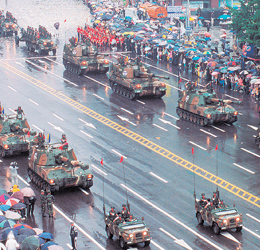 |
|
A military parade takes place on a Seoul street on Armed Forces Day.
|
Air force colonels say a change in N.K. defense strategy needed
Two high-ranking South Korean military officers have called for a change in South Korea’s military strategies regarding North Korea, saying a preemptive strike ahead of Pyongyang’s use of weapons of mass destruction would be necessary. "Now, as the North possesses nuclear weapons, the age-old strategy of ’defend first and attack later’ has lost its rationale," Colonel Kwon Jae-sang and Lieutenant Colonel Park Bong-kyu of the nation’s Air Force wrote in a paper presented November 9 at a seminar held at Seoul’s Yonsei University. "This means that we need offensive strategies [in dealing with the North]," their paper read. The two officers are professors at the South Korean Air Force Academy; the seminar was jointly organized by the Institute of State Governance at Yonsei University and the RAND Corporation, a U.S.-based think tank. The two military professors argued that the North’s recent nuclear test highlights the need for new defense planning and military strategies in South Korea. "We will have to establish offensive strategies during the time that will be spent by the North in mobilizing ’strong’ weapons."Experts say the remarks mean that South Korea should take a more proactive stance in order to neutralize any attempt by the North to use nuclear weapons against South Korea. This is the first time that South Korea’s ranking military officers have officially demanded such a move after Pyongayng conducted a underground nuclear test on October 9. The seminar was attended by Kim Sung-il, South Korea’s Air Force chief of staff. Prof. Park pointed out that such offensive strategies would be different from a U.S.-led preemptive strike. "The U.S.’s preemptive strike would be carried out in a way to attack nuclear facilities in order to stave off threats from the production of nuclear bombs. But the offensive strategies [of South Korea] will be executed only when we spot a sign that the North is preparing for a nuclear attack." The argument comes amid rising concerns about the possible weakness of the current defense-based stance of the Combined Forces Command (CFC), which is focused on the utilization of traditional weapons and ground forces. Under the CFC, South Korea’s military would take charge of ground operations during time of war, while the U.S. would spearhead air and naval forces. South Korea’s armed forces currently depend upon Washington’s nuclear umbrella, as the peninsula has been free of such arms since the U.S. removed the last of its tactical nuclear weapons in 1991. [englishhani@hani.co.kr]





